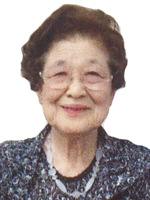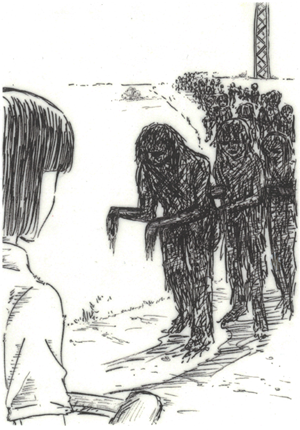Memoir of the A-bombing;
Toward a Nuclear Free World
Megumi Shinoda
Atomic bomb survivor registered with our Foundation

Megumi Shinoda
Atomic bomb survivor registered with our Foundation
August 6, 1945
I was in the second grade of girls' school (age 13). That day I was scheduled to go to work on building demolition work near the Tsurumi-bashi Bridge at the foot of Hijiyama Hill, but I was tired from day after day of work and decided to take the day off. In the morning, a neighbor lady came to borrow a millstone, and my younger brother stood up cheerfully and offered her a bowl of roasted beans, saying, "You should have some too."At that moment, with a roar, a huge flame entered the back of the house. The sliding paper door near me burst into flames, and I thought, "I have to pour water on it," and started to get up... At that moment, the tatami floor under my feet slid down to the ground, and I fell too, holding my head to protect myself. The blast that came immediately afterwards blew everything away, leaving a one-meter hole in the roof and the house with only the pillars remaining. The futon that was hanging out to dry in the yard was blown through three rooms and into the kitchen, along with a clothesline that had snapped into an L-shape. My mother was severely burned on her face and limbs, and my younger brother was severely burned on his hand that was holding out a bowl.
It was not safe to stay home, so I went to my mother's aunt's house to borrow a big cart to carry the two burned people. The houses in the neighborhood looked seriously damaged.
When I told her what had happened, she pushed the big cart up to the road on the bank and told me to bring them to her quickly.

People fleeing the city after the atomic bombing
(by Akina Niimiya)
(by Akina Niimiya)

People fleeing the city after the atomic bombing
(by Akina Niimiya)
(by Akina Niimiya)
My father, who was working at the army clothing depot, came home in the middle of the night. All I could manage to say was, "Sachiyo is still not home..." My father's eyes were wet with tears, as if he had guessed everything.
Went to the city to look for my sister
On the 7th, my father and I went to Yokogawa to look for my sister, Sachiyo, thinking that she might have returned to Yokogawa, because the head office where she worked was located there. When we opened the burnt-out door of the head office, we found ourselves in another hellish scene. People were lying on the ground, their bodies red and swollen, their eyes vacant. As if they had sensed our presence, they kept repeating, "Mother…Water…" I stood there, unable to take a single step inside. My father looked inside for my sister, but she was not there.We headed south on the train road to Tokaichi. There, the train was burned to the ground, and one person was found dead in his seat. When we looked toward the Aioi bridge near the hypocenter, we saw lying there the charred dead bodies of people whose gender was unknown. Some of the corpses could be identified as soldiers by the gaiters on their burnt legs. Three horses were also burned to death, their bellies torn open and overflowing with yellow guts.
We put our hands together in front of the credit union and prayed, "Dear God and Buddha, please protect Sachiyo."
As we walked north along the river bank from the Aioi Bridge back to our house, we saw many evacuees gathered at Oshiba Elementary School, my old school. As we walked back to the house, I heard a thin voice from the back of one of the big carts say, "You must be Sera (my maiden name), aren't you?" I looked into the person's face, but could not recognize her because her face was red and swollen and her physiognomy had completely changed. I knew the person pulling the big cart, so I realized that the person was my classmate, Okada-san. I was unharmed.... I realized that if I had gone to the building evacuation yesterday, I would have ended up like this or even died, and I could not find any words to say to Okada-san. I wonder what happened to Okada-san after that. I will never forget this until the day I die.
We could not find my sister that day. I felt I had to look for my sister, but for now I had to clean up our broken home and rest. I was very happy to be able to sleep on the tatami mats. But from that day on, my mother never lay down at night, but sat leaning against a pillar, waiting every night for my sister Sachiyo's return.
Anxiety that continues to this day
On August 15, 1945, I learned of the defeat in the war through the broadcast of the voice of Japan's Emperor. My father had foreseen the defeat, and I knew that what he had predicted came true. After the war, my brother and cousin were safely demobilized.The bandage on my younger brother Haruki's arm was removed by mid-September, but diarrhea, one of the A-bomb diseases, began around October. He would say things like, "I don't want sweet potatoes," or "I don't eat pumpkin," much to my mother's dismay. I can imagine how difficult it must have been for my mother, as there was nothing else she could feed her sick child. I still cannot forget the way she gently wiped her tears from her eyes while hiding. My brother, emaciated like a skeleton, passed away on October 22 with his mother holding him tightly to her chest, joining Sachiyo.
A few years later, my father developed liver cancer, my mother stomach cancer, and my eldest sister lung cancer. My brother and cousin both died of leukemia, probably from digging up ashes from the burnt ruins of the bombing during restoration work. I was diagnosed with pancreatic cancer during a medical checkup and underwent major surgery at the age of 78. More than 78 years after the war, hibakusha are still anxious.
What I want to tell you
War is evil. It is said that there are about 13,000 nuclear bombs in the world today, and that they are tens or hundreds of times more powerful than the "Little Boy" that was dropped on Hiroshima. The use of such weapons would destroy the Earth. I will continue to share my A-bomb experience with as many people as possible so that we can have a peaceful world without war and without nuclear weapons.In conclusion, I would like to share the words of Ichiro Moritaki, an ethicist and activist against atomic and hydrogen bombs, and Suzuko Numata, an A-bomb survivor who was my high school teacher.
"Nuclear weapons and mankind cannot coexist."
"Peace cannot come from a heart of hate."
Masaki Hironaka
Born in 1939.
For many years, he has testified about his experience of the atomic bombing both in Japan and overseas. Since 2022, he has been commissioned by the Hiroshima Peace Culture Foundation to serve as a witness to the A-bomb experience.
His motto is "Gratitude for life, live in the present."
For many years, he has testified about his experience of the atomic bombing both in Japan and overseas. Since 2022, he has been commissioned by the Hiroshima Peace Culture Foundation to serve as a witness to the A-bomb experience.
His motto is "Gratitude for life, live in the present."
Hiroshima Peace Culture Foundation
1-2 Nakajima-cho, Naka-ku, Hiroshima 730-0811 JAPAN
Phone 082-241-5246
Copyright © Since April 1, 2004, Hiroshima Peace Culture Foundation. All rights reserved.